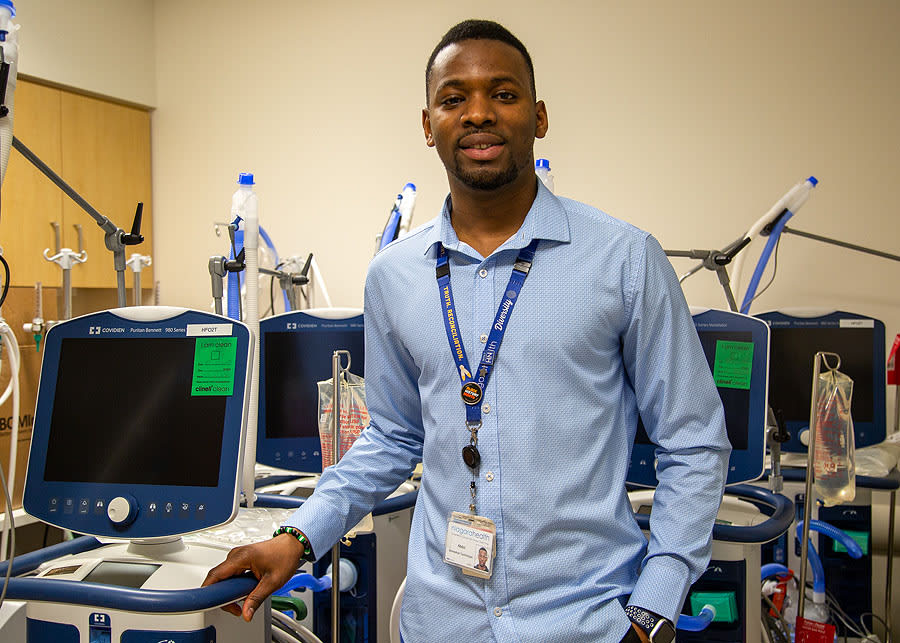We are Niagara Health is a series of stories that celebrates the incredible people working and volunteering in our organization and how they make a difference in the lives of patients and coworkers every day.

Biomedical Technologist Abdul Adekitan came to Canada from Nigeria when he was 17 with the hope of one day becoming a physician.
Give Abdul-Qoyyum Adekitan something broken and he won’t just fix it. He’ll figure out why it failed in the first place.
“I’ve always been that person who fixes things, but I had a different perspective,” Abdul says. “You might find what is failing but I want to know what is contributing to it failing? It’s those little things that someone might not pay attention to that is causing problems.”
That mindset makes Abdul a natural in his role as a biomedical technologist at Niagara Health, where he repairs medical devices for the Intensive Care Unit, Endoscopy and Pre-Op units, Mental Health and Addictions, Pharmacy, Minor Surgery, and the Pain Clinic.
The relentless curiosity driving him to seek out overlooked details also fuels his ambition to one day help people as a physician.
For Abdul, who grew up in Port Harcourt, Nigeria, healthcare was often reduced to quick fixes – medication to treat symptoms rather than causes. But working on several projects alongside his mechanical engineer father as a child taught him that real repair -- whether for machines or people -- requires looking beyond the obvious.
“That patient having repeat visits – sometimes it’s due to the social determinants of health. What kind of lifestyle do they have? What supports do they have? What can we fix first?” he says. “One of the mindsets I’ve always had, and hope to keep, is seeing someone as a whole and not just as a patient. It’s learning more about the patient, why they’re having the issue and how I can think outside the box to help them fix it.”
Abdul’s journey toward medicine started when he was 17 and decided to move to Canada alone, with only an aunt in Toronto as his support network. He enrolled in the biomedical engineering technology program at Centennial College and became active in his new community, including volunteering as general secretary and youth activities co-ordinator at NASFAT Mosque in Etobicoke.
He chose biomedical engineering technology with medical school in mind, but didn’t realize that would require a university degree – not a college diploma – until midway through his program.
“I felt I belonged here. They made me feel like this was the right place to be as a young person and to develop as a technologist. I still feel like that every day and come into work with a smile on my face.”
A sense of belonging, a driver of change
In the meantime, Abdul turned his attention to finding a job. He had offers of full-time, permanent positions, but chose a part-time, casual role at Niagara Health in 2019 after his interview with Richard Sit, Biomedical Technology Supervisor, who was a charge technologist at the time, and Natalie Ferraro, interim Director of both Nursing Practice and Laboratory Services, who was managing dialysis.
“I felt I belonged here,” Abdul says. “They made me feel like this was the right place to be as a young person and to develop as a technologist. I still feel like that every day and come into work with a smile on my face.”
Since joining Niagara Health, Abdul’s role has expanded beyond his initial post as a dialysis tech to supporting operations across multiple departments. Last year, he was seconded to Project Monarch to help integrate biomedical technology into the Hospital Information System.
He earned his medical sciences degree from Brock University and plans to apply to several Ontario medical schools, including McMaster University’s Michael G. DeGroote School of Medicine – Niagara Regional Campus.
Part of the allure of studying locally includes efforts by his biomedical colleagues and Niagara Health to celebrate Black History Month and Black excellence in healthcare.
Black History Month was new to Abdul when he came to Canada. In Nigeria, it’s simply a part of everyday life, he explains. Now, wearing his Black History Month button on his Niagara Health lanyard, he’s proud to answer questions. He will also address another concept that was foreign to him before moving here: microaggressions.
Microaggressions are comments or behaviours, sometimes done without awareness, that express bias toward equity-deserving groups and have a harmful impact.
“A lot of people don’t know they’re committing microaggressions and that’s why they’re doing it,” Abdul says. “I don’t believe people are doing it because they know it’s wrong and do it anyway. It’s ignorance, not arrogance. I’m all about informing people and making people aware.”
Abdul is also committed to addressing larger systemic barriers that Black professionals face, particularly in hiring. While studying at Brock, he served as a student advisor on a committee overseeing the recruitment of a new Black professor.
The person who was hired noted how different – and positive – the experience was, Abdul recalls.
It’s opportunities like that – fixing things at the root rather than on the surface – that drive Abdul to be the change he wants to see, whether as biomedical technologist, student, Black History Month ambassador and, one day, the physician he is determined to become.
“I’m not a fan of how things have always been done,” he says. “I’m focussed on how we can do it better.”

